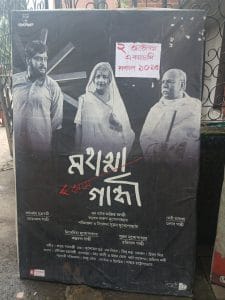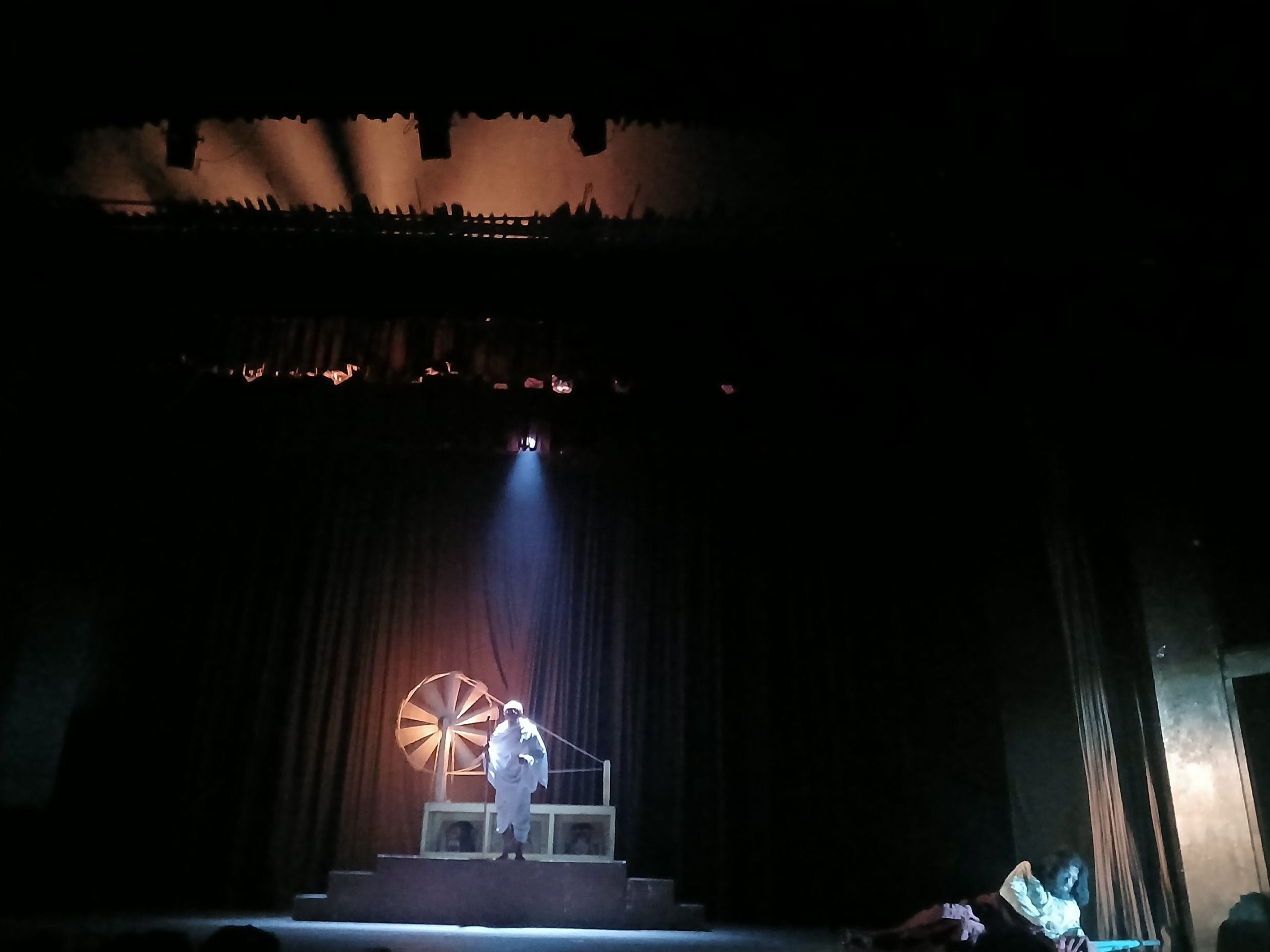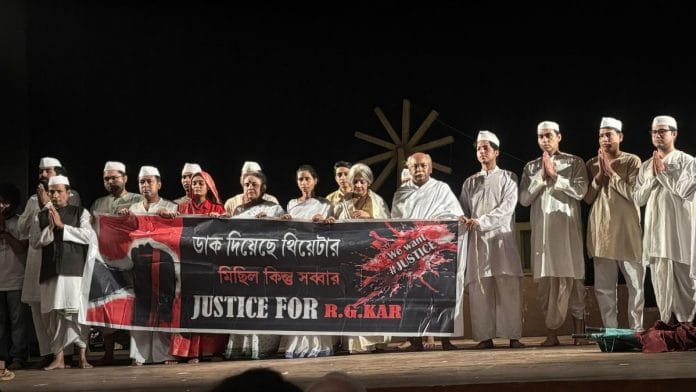Kolkata: It perhaps says something about Kolkata that it staged a play that attempted to strip Mohandas Karamchand Gandhi of the Mahatma tag on Gandhi Jayanti. Directed by Sujan Mukhopadhyay, Mahatma versus Gandhi depicts the binary between the man and the Mahatma, laying bare the dark side of his idealism. The Bengali play opened to a packed hall at the Academy of Fine Arts, even as protests demanding justice in the RG Kar rape and murder case unfolded outside.
Based on Dinkar Joshi’s 2007 novel of the same name, the play highlights Gandhi’s troubled relationship with his eldest son Harilal. While he roused an entire nation against the British, Gandhi couldn’t help his own son from turning into an alcoholic destitute. Harilal was unable to emerge from his father’s shadow, failed in business, turned to Islam only to reconvert to Hinduism, and remained an embarrassment to his family throughout his lifetime. In his letters to Harilal – put up for auction in 2014 by Mullock’s Auctioneers in the United Kingdom – Gandhi even accused him of raping his own daughter Manu.
“Manu is telling me a number of dangerous things about you. She says that you had raped her even before she was eight years and she was so much hurt that medical treatment was also to be taken,” the Gujarati letter reads.

The play shows Harilal before his life unravelled. A young man trying hard to get his father’s attention and approval, pleading for a chance to follow his own dreams, and failing to live up to the higher moral code that Gandhi himself could not often adhere to. It shows Gandhi as an absentee father trying to save the world even as his own son cries out to him for help.
The play ends up robbing Gandhi of his halo even as it reveals Harilal’s dark truths.
Also read:
Fathers and sons, saints & politicians
Sujan Mukhopadhyay, who also plays Harilal Gandhi, delivered a moving monologue to thunderous applause from the audience:
“What do fathers want from sons? Who knows? It’s different for trees and seeds. Trees tell seeds to find their own earth, explore their own destiny, to grow as trees and give shade to the needy. Why can’t fathers tell the same to their sons?”
Mahatma versus Gandhi began with the sound of the three bullet shots that ended Gandhi’s life but is essentially an exploration of Harilal’s frustration with his father’s unrealistic worldview. It killed his dreams and pushed him down a very dark path.

One scene in the play shows when Harilal’s resentment first took root. The young man had just returned from England to South Africa, where his father (played by Anirban Chakraborty) was leading the non-violent resistance for civil rights. He craved a cup of coffee with sugar, but Gandhi had, as a point of principle, replaced it with jaggery in his ashram. Despite his wife Kasturba (Nibedita Mukhopadhyay)’s pleadings, he did not let his son have coffee his way.
Later, much to the shock of Harilal, who was yet to get accustomed to Gandhi’s harsh moral codes for ashram inmates, he saw his father chide his mother in front of outsiders for stealthily letting her son have sugar with his milk.
Harilal would soon come to realise that following in his father’s footsteps, charting a moral path and becoming Chhota (young) Gandhi were the only ways to survive the ashram. He did so for some time, but his father’s indifference toward his own family as well as Harilal’s desire to chart his own path made him leave the ashram and gradually, his own sanity.
The play also shows how it was not just Harilal who delinked Gandhi from the Mahatma. His wife did so too. In one scene, the actor who plays Kasturba says to Harilal’s wife Gulab (played by Meri Acharya): “Ba is behind him, that is why Bapu can go ahead”, reflecting on a lifetime of enduring Gandhi’s whims and fancies, and implying that her husband wouldn’t succeed without her support.
As the play progressed, the audience was left with deeply troubling questions. Was Harilal a ‘weakling’ who simply did not measure up to an illustrious father? Or was Gandhi a selfish parent who sacrificed his son and family at the altar of his moral calling? The audience struggled to gauge who he really was: A saint who wanted to become a politician or a politician who was attempting to become a saint.
Mahatma versus Gandhi gave no definitive answers, instead casting doubt on the Gandhi story. Anirban Chakraborty told ThePrint that whether Gandhi was Mohandas or Mahatma is up to the audience to decide. “He was both. But what he was more of is not for me to say. I try to play him as a father with as much conviction as I can muster,” Chakraborty said.
Abhijit Gangopadhyay, retired justice of the Calcutta High Court and BJP MP who had come to watch the play, said that the stage direction and the rousing performances made Mahatma versus Gandhi a compelling watch. “Gandhi needs deeper exploration. Currently, I am searching for Netaji Subhas Chandra Bose, digging deep into historical records to find out the truth about him. Once that is done, I will look for Gandhi.”
The play ended with the actors joining hands on stage and making an impassioned plea for accountability in the RG Kar case. As champions of justice, both Mahatma and Gandhi would have approved.
(Edited by Zoya Bhatti)






